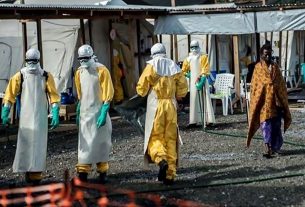So many have fled in such a short period that even the sprawling makeshift tent cities that abut the Turkish border are now full, forcing thousands to sleep out in the open.
Aid agencies warn the situation is untenable and is now threatening to turn into one of the worst humanitarian disasters of the eight-year war.
They are among the 235,000 people who have fled air strikes and shelling elsewhere in Idlib province in recent weeks. The exodus was triggered by ramped-up Syrian and Russian attacks on some of the most densely populated areas of the country’s last-remaining rebel bastion.
Most of the 3.5 million people living in the province had been displaced from formerly rebel-held areas across the country and as a result have nowhere left to go.
The families huddle for warmth as the temperatures drop to nearly zero degrees celsius. Babies are bundled in coats and blankets, the adults burn wood and use up the last of their dwindling gas supplies.
They have been sending in truckloads of aid into Idlib and accepting some of its most urgent medical cases, but have signalled they are not prepared to offer much else.
It is in Europe’s interest to help avoid a large-scale humanitarian disaster. Ankara has threatened to send new arrivals its way if it is pressured to open the border.
The Syrian offensive is part of the regime’s strategy to secure the M4 and M5 highways running through Idlib, both key routes connecting the government-controlled cities of Aleppo and Hama with capital Damascus.
Assad has promised to retake “every inch” of Syria, but the rebels, who are largely aligned with Islamist group Hayat Tahrir al-Sham (HTS), have had years to dig in.
The city of Maaret al-Numan, which had a population of around 100,000, has been at the centre of Assad’s most recent campaign. It had become known for its fierce resistance to the regime, but also in more recent times for its resistance to HTS and the hardline groups who overran it.
Intense shelling and strikes has driven out virtually the entire population. Footage captured by a handful of remaining residents shows a decimated ghosttown.
Dareen Khalifa, a Syria analyst with the International Crisis Group, said she believed government forces have been “overcompensating” for the slow progress made so far in Idlib by using “devastating levels of air force.”
“If the regime continues and if the rebels don’t surrender, this will mean the worst humanitarian disaster we’ve seen in Syria,” she said. “The casualties and displacement levels are catastrophic.”
There have been at least 65 attacks on 47 health facilities in Idlib since the offensive began in earnest in April, according to the Syrian American Medical Society (SAMS). Earlier this year, UN officials alleged Russian forces may be deliberately targeting hospitals and schools as a tactic to “terrorise” civilians – accusations denied by both Damascus and Moscow.
The bombing campaign has killed more than 5,262 civilians, including 246 children, since April, according to the Syrian Observatory for Human Rights, a Britain-based war monitoring group. More than 100 of whom died in the last week.
Russia and China last week vetoed a United Nations Security Council resolution that would have allowed aid to continue flowing to Idlib. The UN, US and its European partners have been able to do little other than issue statements of condemnation.
“It seems that 2019 was the year the international community and the UN completely abandoned Syria and politicians have even run out of words of condemnation,” said Raed Al Saleh, head of the White Helmets civil defence this week.
“My biggest fear as the year comes to a close is for the attacks to intensify further, causing new waves of displacement because there is nowhere left for people to run to. Every olive tree has become a tent and every camp has exceeded its capacity ten times over,” he said.





